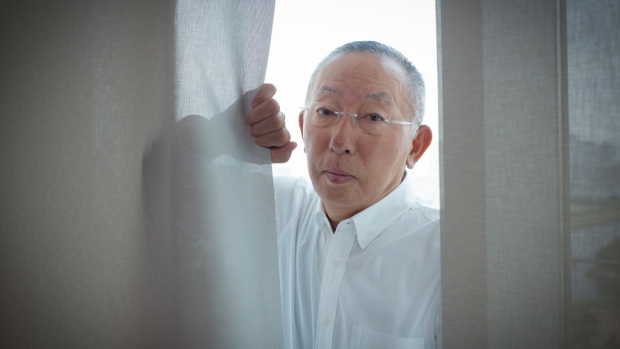Sep 3, 2019
Billionaire Uniqlo Founder Wants a Woman to Succeed Him as CEO
, Bloomberg News

(Bloomberg) -- Tadashi Yanai, Fast Retailing Co.’s 70-year-old billionaire founder, said he would prefer to be succeeded by a woman, which would be better for Asia’s largest retailer.
“The job is more suitable for a woman,” Yanai, the chief executive officer behind clothing giant Uniqlo, said in an interview. “They are persevering, detailed oriented and have an aesthetic sense.”
As Yanai gets older, he’s been asked more frequently about succession at the company, which he built from his father’s tailor shop into a global brand. A possible candidate could be Maki Akaida, who was appointed this year to run Uniqlo’s Japan operations — the company’s most profitable unit. Yanai said he wants to increase the ratio of female senior executives to more than half the total. Fast Retailing currently has six women in such roles, after hitting its goal last year of having more than 30% of women in management positions.
Japan has faced scrutiny over its lack of gender diversity in top management roles; only 4.1% of women in the country hold executive titles at publicly traded firms. That pales in comparison with places such as the U.S., where women make up about a quarter of executive ranks, according to multiple studies.
“It’s a possibility,” Yanai said when asked whether Akaida would be a potential successor.
Any successor to Yanai would inherit one of Japan’s more recognizable global brands, after Fast Retailing fought off domestic doldrums by expanding Uniqlo overseas. Revenue has grown consistently, surpassing 2 trillion yen ($18.9 billion) in 2018, mainly through new stores in foreign markets from China to the U.S.
Prime Minister Shinzo Abe has sought to promote women in the workforce amid a labor shortage triggered by the Japan’s aging and shrinking population. With a declining birthrate, the number of people will slump by almost a third by 2060, by which time about 40% will be 65 or over, according to the National Institute of Population and Social Security Research.
“We’re in the business of selling clothes — it’s not so good that we’re old,” Yanai said.
The Southeast Asian region will become an increasingly important part of Fast Retailing’s business, Yanai added. The company said it would invest $1.8 million in a partnership with the International Labour Organization, an arm of the United Nations, to help support factory workers in Indonesia. The ILO will also conduct a study in other countries where Fast Retailing has contract factories to explore ways to improve social protections for workers in the future.
Yanai said such investments are a way to both help pursue business goals and contribute to the world, as upward mobility in developing countries would likely eventually boost Fast Retailing’s top line.
“If we expand in a place where incomes are not growing, we cannot sell clothes,” the CEO said.
To contact the reporters on this story: Lisa Du in Tokyo at ldu31@bloomberg.net;Grace Huang in Tokyo at xhuang66@bloomberg.net
To contact the editors responsible for this story: Rachel Chang at wchang98@bloomberg.net, Kana Nishizawa, Reed Stevenson
©2019 Bloomberg L.P.